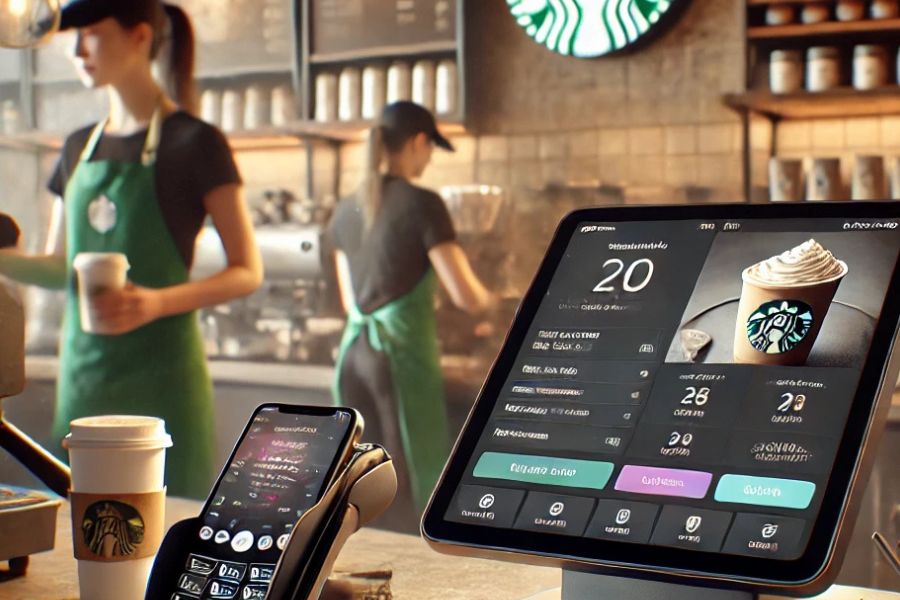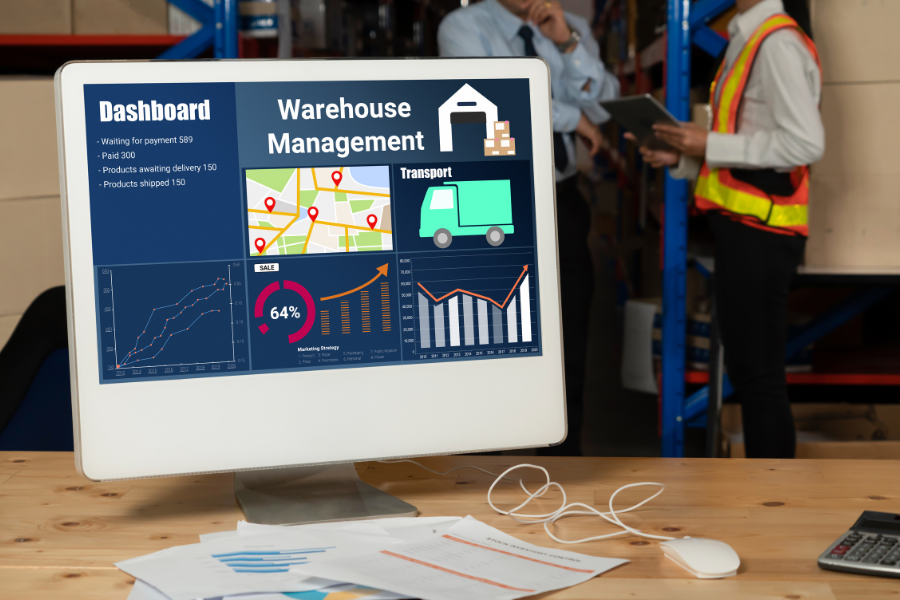As the heartbeat of e-commerce operations, an optimized order fulfillment system is the cornerstone of success for online businesses. In an era where customer expectations for fast and reliable delivery are higher than ever, businesses must continuously refine their processes to stay competitive. Let’s delve into some key strategies that can revolutionize your order fulfillment process and elevate your business to new heights.
What Is The Order Fulfillment Process?
As revealed in a report by Zion Market Research, the global e-commerce fulfillment market reached a value of USD 97.33 billion in 2022. Projections suggest that by 2030, it will soar to USD 230.68 billion. Throughout the forecast period, the market is expected to expand at a compound annual growth rate (CAGR) of 13.12%.

The order fulfillment process is a critical component of any business operation, especially in the realm of e-commerce. It involves a series of steps aimed at receiving, processing, and delivering customer orders promptly and accurately.
Understanding the order fulfillment process is essential for businesses to ensure smooth operations, meet customer expectations, and drive success.
1. Order Placement: The order fulfillment system begins when a customer places an order through various sales channels, such as online stores, mobile apps, or in-person transactions. The order includes details such as the customer’s name, shipping address, contact information, and the products or services they wish to purchase.
2. Order Processing: Once an order is received, it undergoes processing to verify payment, validate inventory availability, and prepare for fulfillment. This stage involves checking product availability, calculating shipping costs, and confirming order details to ensure accuracy.
3. Picking: After order processing, the next step is picking, where the products included in the order are retrieved from the inventory storage area. Depending on the fulfillment method and order size, picking can be done manually by warehouse staff or automated using picking technologies such as barcode scanners or RFID systems.
4. Packing: Once the products are picked, they are packed securely to protect them during transit. Packing involves selecting appropriate packaging materials, arranging products, and sealing the package. Proper packing is crucial to prevent damage during shipping and ensure that products arrive in good condition.
5. Shipping: After packing, the order is handed over to the shipping carrier for delivery to the customer. Shipping methods vary depending on factors such as the shipping destination, delivery timeframe, and customer preferences. Common shipping options include standard shipping, expedited shipping, and same-day delivery.
6. Tracking And Delivery: Throughout the shipping process, customers can track the status of their orders using tracking numbers provided by the shipping carrier. Tracking allows customers to monitor the progress of their shipments in real time and receive notifications about delivery updates. Once the order reaches its destination, it is delivered to the customer’s specified address.
7. Order Confirmation And Feedback: After delivery, the order fulfillment process is completed with order confirmation and feedback collection. Businesses typically send order confirmation emails or notifications to customers to confirm successful delivery and provide instructions for returns or exchanges if necessary.
8 Strategies To Optimize Your Order Fulfillment System
Efficient order fulfillment is essential for the success of any e-commerce business. By optimizing your order fulfillment system, you can enhance customer satisfaction, streamline operations, and improve overall business performance. Here are eight strategies to help you optimize your order fulfillment process:
Update And Integrate Systems For Efficiency
Regularly updating and integrating your order management, inventory management, and shipping systems is paramount for ensuring seamless communication and workflow within your operations.
These advancements improve efficiency and accuracy, allowing you to promptly and accurately fulfill orders, thereby bolstering customer satisfaction.
Investing in modern technology and software solutions that offer automation, real-time tracking, and synchronization capabilities is crucial for improving efficiency and accuracy.
Additionally, prioritizing regular updates and integrations ensures that your systems remain current and compatible with evolving industry standards, allowing you to stay ahead of the curve and maintain a competitive edge in the market.
Enhance Customer Visibility
The order fulfillment system should offer customers insight into their order status is vital for cultivating trust and contentment. Employing order-tracking systems that permit real-time monitoring and notifications at every fulfillment stage enhances transparency.
You exhibit a dedication to exceptional service, instilling faith in your brand. This openness not only reassures customers but also heightens satisfaction levels, ultimately nurturing enduring customer bonds and loyalty.
Transparency plays a pivotal role in establishing brand trust and confidence. Providing customers with immediate visibility into their order status empowers them to stay informed throughout the fulfillment journey. Implementing order tracking systems and notifications guarantees customers are constantly updated, from order initiation to product receipt.
Minimize Shipping Times
If the delivery time exceeds one week, 38% of online shoppers will opt to abandon their order.
Optimizing your shipping processes is paramount to meeting customer expectations for timely delivery. Explore various options, such as same-day or next-day delivery to expedite the shipping process and provide customers with swift order fulfillment.
Additionally, strategic warehouse placement and partnerships with local carriers can significantly reduce transit times, ensuring packages reach customers promptly and efficiently.
To achieve efficient shipping, exploring innovative strategies and partnerships is essential. Consider strategic warehouse placement and partnerships with local carriers to reduce transit times and improve delivery speed.
These efforts to improve the order fulfillment system not only enhance customer satisfaction but also strengthen your brand reputation as a reliable and efficient provider of goods.
Evaluate Warehouse Management
Assessing your warehouse layout, organization, and workflow is crucial for identifying areas for improvement. Consider layout optimization, inventory organization, and workflow efficiency to streamline operations and enhance productivity.
This assessment provides valuable insights into where adjustments can be made to improve warehouse performance and order fulfillment accuracy.
Optimizing storage space and streamlining picking and packing processes are essential steps in improving warehouse efficiency. Implementing efficient inventory replenishment strategies helps maintain optimal stock levels, prevent stockouts, and ensure timely order fulfillment. These efforts contribute to a more streamlined and efficient warehouse operation, ultimately improving overall business performance.
Utilize Data For Inventory Optimization
Leveraging data analytics is crucial for optimizing inventory management and ensuring efficient order fulfillment. Analyzing historical sales data, seasonality trends, and customer behavior patterns provides valuable insights into demand fluctuations.
This enables businesses to maintain adequate inventory levels to fulfill orders promptly, avoiding stockouts and overstock situations.
Utilizing historical sales data, seasonality trends, and customer behavior patterns allows businesses to anticipate demand fluctuations accurately. This proactive approach ensures that adequate stock is available to promptly fulfill orders, minimizing stockout risk and optimizing customer satisfaction.
Monitor And Enhance Performance
Monitoring key performance indicators (KPIs) is essential for maintaining efficiency in order fulfillment operations. Analyzing KPIs allows businesses to pinpoint bottlenecks, inefficiencies, and potential obstacles hindering the fulfillment process.
By identifying these issues, businesses can implement corrective actions to enhance performance and ensure that customer expectations are consistently met or exceeded.
Identifying bottlenecks, inefficiencies, and areas for improvement is just the first step in optimizing order fulfillment operations. Once these issues are identified, it’s crucial to take proactive measures to address them. Implementing corrective actions such as process improvements, workflow adjustments, and technology upgrades can help streamline operations and enhance overall performance.
Prepare For Returns
Developing a streamlined process for handling returns and exchanges is essential for minimizing the impact on your order fulfillment system. Providing dedicated return channels and clear return instructions ensures that customers can easily initiate return requests and receive assistance when needed.
By streamlining the return process, businesses can maintain operational efficiency and uphold customer satisfaction.
Offering hassle-free return options, such as prepaid return labels or return shipping at no cost to the customer, can help facilitate the return process and alleviate any concerns or hesitations customers may have. Clear communication throughout the return process, including confirmation of receipt and timely updates on refund status, reinforces trust and confidence in your brand.
Collaborate With Top Shipping Firms
Partnering with reputable shipping carriers and fulfillment centers is crucial for ensuring reliable and efficient order delivery. These partnerships enable businesses to leverage shipping carriers’ and fulfillment centers’ expertise and resources, resulting in improved delivery performance and customer satisfaction.
Negotiating favorable shipping rates and accessing advanced technologies are key advantages of partnering with reputable shipping carriers and fulfillment centers. Businesses can secure competitive pricing and access innovative shipping solutions.
Advanced technologies such as real-time tracking, automated labeling, and route optimization can streamline order fulfillment operations and enhance efficiency.
How ConnectPOS Can Boost Your Order Fulfillment System
- Seamless Integration: ConnectPOS seamlessly integrates with popular e-commerce platforms such as Shopify, WooCommerce, Magento, and BigCommerce. This integration ensures smooth communication between your POS system and online store, enabling real-time inventory, orders, and customer data synchronization.
- Efficient Order Management: With ConnectPOS, you can efficiently manage orders from multiple sales channels in one centralized dashboard. ConnectPOS provides intuitive tools and workflows to streamline operations and minimize processing times, from order processing to fulfillment.
- Real-time Inventory Management: ConnectPOS’s real-time inventory management feature helps you stay on top of your inventory levels. You can easily track stock levels, receive low-stock alerts, and manage inventory across multiple locations or warehouses to prevent stockouts and ensure timely order fulfillment.
- Flexible Payment Options: ConnectPOS supports a wide range of payment methods, allowing you to offer flexible payment options to your customers. Whether it’s credit/debit cards, mobile wallets, or digital payment platforms, ConnectPOS ensures smooth and secure transactions, enhancing the checkout experience.
- Advanced Reporting and Analytics: Leverage ConnectPOS’s advanced reporting and analytics tools to access valuable insights into your order fulfillment performance. Monitor essential metrics like order accuracy, on-time delivery rates, and fulfillment cycle times, enabling you to pinpoint areas for enhancement and drive data-driven decision-making.
- Customer Engagement Tools: ConnectPOS offers customer engagement tools such as loyalty programs, promotions, and discounts to enhance customer retention and loyalty. By incentivizing repeat purchases and rewarding loyal customers, ConnectPOS helps drive sales and grow your business.
- Effortless Returns Management: ConnectPOS’s effortless returns management feature simplifies the returns process. It allows you to easily process returns and exchanges, provide refunds or replacements promptly, and maintain customer satisfaction even in the event of a return.
- Responsive Customer Support: ConnectPOS provides responsive customer support to assist you with any questions or issues you may encounter. Whether it’s technical support, training, or troubleshooting, our team is dedicated to ensuring your success with ConnectPOS.
FAQs About Order Fulfillment System
- What Is Order Fulfillment Efficiency?
Order fulfillment efficiency refers to the ability of a system or process to fulfill customer orders quickly, accurately, and cost-effectively. It encompasses various factors such as order processing time, inventory management, shipping speed, and overall customer satisfaction.
- What Is The Supply Chain And Order Fulfillment Strategy?
A supply chain and order fulfillment strategy involves planning and executing processes to efficiently manage the flow of goods from suppliers to customers. It encompasses decisions regarding sourcing, manufacturing, warehousing, transportation, and distribution to optimize the supply chain and meet customer demand effectively.
- What Is The Order Fulfillment Process For Ecommerce?
The order fulfillment process for e-commerce typically involves receiving and processing customer orders, picking and packing products from inventory, shipping orders to customers, and updating order status and tracking information. It also includes handling returns and exchanges to ensure a seamless customer experience.
- What Is The Objective Of Order Fulfillment System?
The primary objective of order fulfillment is to deliver products to customers in a timely and efficient manner while meeting their expectations for product quality and service. By achieving high levels of order fulfillment accuracy and reliability, businesses can enhance customer satisfaction, build loyalty, and ultimately drive sales and revenue growth.
- What Is The Difference Between Order Management And Order Fulfillment?
Order management involves the entire process of receiving, processing, and tracking customer orders, from the initial order placement to final delivery and beyond. It includes order entry, inventory management, order processing, and customer communication.
Conclusion
Optimizing your order fulfillment system isn’t just a matter of logistics—it’s a strategic imperative for thriving in the dynamic world of e-commerce. As businesses continue to evolve and adapt to changing market demands, the pursuit of optimization remains an ongoing journey—one that is essential for staying ahead of the curve and achieving sustainable growth in the digital age.
Do you have more questions about ConnectPOS and how it can help to improve your order fulfillment system? Reach out to us today.
ConnectPOS is a all-in-one point of sale solution tailored to meet your eCommerce POS needs, streamline business operations, boost sales, and enhance customer experience in diverse industries. We offer custom POS with features, pricing, and plans to suit your unique business requirements.




